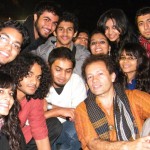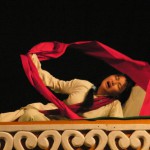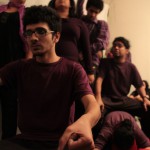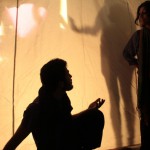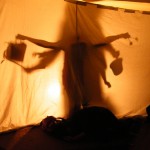Gender Shadow: A Chance to Interrupt Injustice, a shadow theatre performance, was put up by a group of second-year students from the Srishti School of Art, Design and Technology at the Women’s Study Cell at Women’s Christian College, Calcutta, on 15 December, 2010. The group—accompanied by course coordinators Arzu Mistry and Evan Hastings—was visiting Calcutta to participate in the ‘Theatre of the Oppressed’ conference organized by Janasanskriti and put up two shows of Gender Shadow, a unique performance that broke the barrier between actor and audience and introduced the concept of ‘spectactor’.
Structured in eight acts, Gender Shadow brought together several instances of discrimination along the lines of gender, ranging from topics that are often discussed to those that are almost always hushed up or pass unnoticed. The performance led each separate instance of injustice back to what it considered the basic common cause of all of them: the rigid perceptions of masculinity and femininity in society. The same construct of male invincibility that would prevent a young boy from seeking help for sexual molestation, for example, resurfaces when a docile young man feels compelled to physically assault another man who may have stared at his girlfriend, and may even be not quite different from the impulse that compels an ‘eve-teaser’ to assert his masculinity over women who are sexually unavailable to him otherwise. The construct of femininity, on the other hand, influences educated urban woman to unconsciously accept the ‘natural rightness’ of wearing ‘safe’ clothes, returning home at ‘safe’ hours or always staying a few steps behind her male counterpart. The performance ended memorably with both the representative male and female actors yelling at each other, ‘Stop underestimating me!’ – proof that both genders feel equally driven and repressed by the constructs that define them.
Through the concept of ‘spectactor’ the Srishti group encouraged their audience to interact with the presented stories by intervening or even replacing the actors with themselves in order to come up with different outcomes or solutions. A round of opinions was followed by the group members joining the audience for a few simple theatre exercises, and then the scenes of Gender Shadow were re-enacted with modifications, opening up a new space for discussions on gender roles and identities.
—Monidipa Mondal (Deptartment of English, Jadavpur University)


